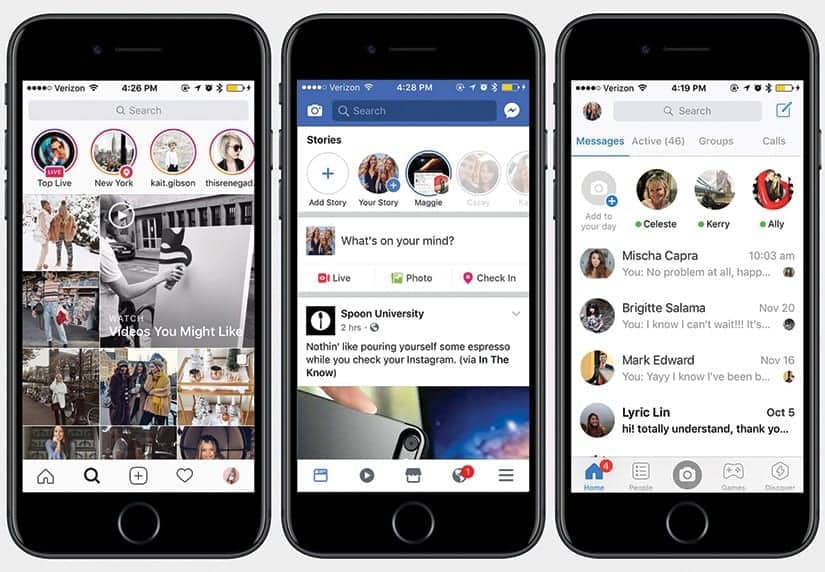Facebook is Not Failing Marketers. Agencies Are.
A Forrester Research analyst recently penned an open letter to Mark Zuckerberg, in which he claimed that Facebook is failing marketers, citing...

Facebook recently rolled out Facebook Stories on their mobile app, a new feature that allows users to share a collection of photos and videos with their friends that disappear after 24 hours. Sound familiar? Probably because you’ve seen this feature introduced to the social media sphere by a little company called Snapchat. You might have heard of them.
This isn’t the first time Facebook has adopted one of Snapchat’s main features for their own use. Instagram (which is owned by Facebook) rolled out “Instagram Stories” just last August. Facebook has since added the feature to two other apps it owns, WhatsApp and Messenger, making this the fourth time it has now copied Snapchat.

Messenger, Facebook and Instagram all feature a Stories function. (Image via Recode)
The rollout of Facebook Stories was initially met with skepticism from users. Many were quick to point out the “blatant rip-off” of Snapchat’s main feature and #StoriesEverywhere quickly began trending on social media platforms. Some users were so impassioned over the change they turned the rollout into a meme, showing the stories function appearing everywhere in their daily lives such as their cars, calculators, Microsoft Excel and even books.
Unfortunately for the social media giant, Facebook Stories seems to have been a miss. Within the first week of its rollout, use of the Stories feature has been minimal, if at all. In a move that seems to confirm the roll-out isn’t working, Facebook already updated the feature this week. Now users see grayed-out icons of friends who haven’t “added to his/her story recently” instead of an empty feed, perhaps an attempt to motivate users to use the feature.
The feature is still new, so maybe users simply need time to get adjusted to the new social platform feature. A recent survey from Morning Consult indicated Facebook Stories has potential with millennials. Forty-three percent of those surveyed ages 18-29 and more than half of those ages 30-44 said they are likely to use the feature. Only time will tell how “likely to use” will translate to actual usage.
Unlike other social platforms, where brands and regular day-to-day users all use profiles, Facebook makes brands and influential figures use “Pages” to reach their fans. As of now, Facebook Stories has only rolled out to user profiles, so, there aren’t any immediate implications for brand pages just yet. However, we can assume that Facebook is not likely to roll out features that won’t eventually equate to advertising dollars, so chances are Facebook will roll out an ads feature in between user stories (just like Snapchat). Facebook also partnered with a handful of brands to create “masks” advertising upcoming movie releases such as Despicable Me 3, Guardians of the Galaxy Vol. 2 and Power Rangers, indicating that they will likely partner with other brands in the future.
However, if/when brands are given access to participate in the Facebook Stories function, they should be cautious. Too often, we see brands rush to an advertising platform simply because is shiny and new, not necessarily because it will produce the intended results. Consumers are more discerning now than ever. They don’t want advertising interrupting their social media experience and if it does, they have extremely high expectations for its authenticity and relevancy. Millennials and Gen Z-ers are even more judicious and when a brand tries too hard to engage with what it thinks these audiences want, they won’t hesitate to call those brands out. Pepsi’s recent ad heard round the world featuring Kendall Jenner joining a protest is one the most recent instances.
Of course, Facebook’s major announcement this week surrounding their plans for mainstreaming augmented reality is an indicator that copying Snapchat’s feature was part of a larger plan. According to Mark Zuckerberg, Facebook Stories was the first step in rolling out its Camera Effects platform which enables developers to create augmented reality images, filters and interactive experiences. This is unchartered territory for brands, but could present some very interesting implications for the future of advertising.
Pushing aside these implications and the fact that Facebook Stories seems to be dead on arrival, these highly-coveted younger audiences will probably give some heavy side-eye to brands attempting to engage with them on Facebook Stories, if it even lives to see the day of monetization.

A Forrester Research analyst recently penned an open letter to Mark Zuckerberg, in which he claimed that Facebook is failing marketers, citing...

1 min read
Facebook has come a long way since it’s first ad placements: banner ads called Facebook Flyers that allowed advertisers to target college students...